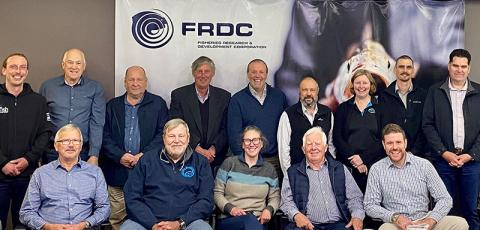New national committee established to guide research priorities for the recreational fishing sector.
By Brad Collis
The release of the National Social and Economic Recreational Fishing Survey, highlighted the positive economic and health benefits of recreational fishing for Australians and coincided with the development of a new national recreational fishing committee.

The new national recreational fishing committee
The social and economic survey shows that one in five Australian adults engage in recreational fishing, contributing 100,000 jobs and $11 billion to the Australian economy.
To support the sustainability of this growth, a committee representing recreational fishing bodies across the country has been formed to oversee research, development and extension (RD&E) priorities. The formation of this committee was jointly supported by FRDC and the Australian Recreational Fishing Foundation (ARFF).
The objective is to compile and prioritise, at a national level, research and extension priorities to help ‘rec’ fishing bodies implement any cultural and behavioural changes needed to ensure fish populations remain healthy.
The new oversight committee comprises representatives from each of the ARFF’s member organisations, an independent chair, and at least one member of FRDC’s extension officer network. This is to ensure fair representation of each jurisdiction and local research expertise through FRDC extension officers. The full list of ARFF members can be found on the ARFF website.
FRDC Senior Research Portfolio Manager Mr Josh Fielding says FRDC and ARFF will work with the recreational fishing community to address the RD&E priorities put forward.
“While there is a lot of research done at a state level, generally funded by trust funds from licence fees, there is need for research common across all jurisdictions,” Josh says.
“This new national committee provides a platform for bringing these needs together and to act as an advisory ‘pipe’ on research recommendations direct to FRDC.”
Ms Cassie Price from the rec fishing conservation body, OzFish Unlimited, sees the committee as a way to facilitate dialogue between researchers and fishers.
“It will give recreational fishers a say in research priorities, but importantly also provide one avenue in which research outcomes can be communicated,” she says.
“Our experience has shown the importance of identifying local champions; not just avid fishers but fishers who are keen to learn and share the fishing knowledge coming from the science. The information needs to be made clear and practical.
“It’s crucial that research extension shows what new fishing methods or recommendations look like in practice. It has to be practical to understand and adopt, so that best practice becomes habit,” says Cassie.
The National Social and Economic Survey of Recreational Fishing, jointly conducted by ABARES, the University of Canberra and ARFF, and funded by the Australian Government and FRDC, is the first national survey of its type in more than two decades.
ABARES Executive Director, Dr Jared Greenville, says the survey provides a current picture of recreational fishing in Australia, including information on participation rates, as well as the contribution to the economy and society.
“A total of 4.2 million or one in five adult Australians are estimated to participate in recreational fishing each year; the number increasing proportionately as the population has increased.”
Jared says the survey shows Australians spend 28 million days fishing each year. This comprises people who fish a few days a year to weekly activity.
“This is estimated to contribute more than 100,000 jobs and over $11 billion a year to the Australian economy,” he says.
The survey also supported anecdotal evidence that recreational fishers have, on average, higher levels of wellbeing than non-fishers. It found that recreational fishing appeared to support positive social connections, nature connection, relaxation and can help achieve recommended levels of physical activity.
“The survey results also shows that most Australians have a positive outlook on recreational fishing, with 79% of Australian adults considering recreational fishing to be an acceptable activity,” Jared says.
“Recreational fishers also contribute to environmental stewardship by picking up rubbish when out fishing, while some participate in habitat restoration activities or donate to organisations trying to improve aquatic health.”
President of the Australian Fishing Trade Association (AFTA), Michael Starkey, says the survey provided a critical tool in shaping the future direction of recreational fishing and this included retailers, wholesalers, manufacturers, and charter operators.
Michael says the survey reflected the industry’s strength, despite the impacts of COVID lockdowns, and he notes the survey measure did not include fishers under 18 or over 65.
FRDC Managing Director Dr Patrick Hone said the study confirms recreational fishing’s importance in Australian culture as well as contributing to health and wellbeing.
He says that timely research on recreational fishers was important to informing fisheries management, especially in a changing climate.
“Critical to FRDC is investing in research to ensure scientific evidence underpins sustainable management of aquatic resources for the benefit of all Australians - whether it’s for commercial or recreational purposes.”
Patrick says the study confirmed the need to invest in further recreational fishing research, to ensure fishing can be enjoyed now and for generations to come.
More information
National Social and Economic Survey of Recreational Fishers
This reflects R&D Plan Outcomes 1, 3 and 5





